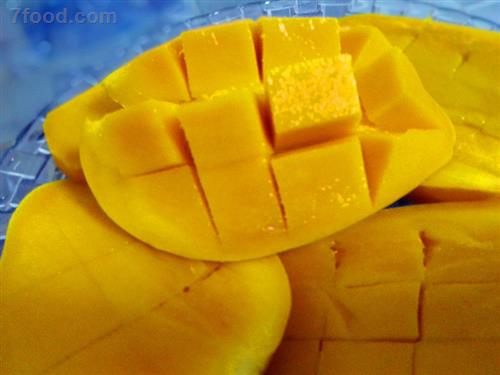What are the symptoms of eating mango allergy? How to avoid eating mango allergy?
In general, when people eat too many mangoes or eat ripe mangoes, they will have allergic symptoms.
What are the symptoms of eating mango allergy?
1, facial swelling, inflammation
The most typical symptom of eating mango allergies is the phenomenon of facial flushing caused by allergies, especially the most common facial swelling, because most people like to peel the skin of mango, eat mango directly into the mouth, In this way, mango juice and flesh are on the cheeks of the mouth. Mangoes contain a large number of allergenic acids, proteins and amino acids. Allergies are triggered when the skin on the face comes in direct contact with these allergenic substances.
2, eye swelling and pain
People who eat mango allergy first have symptoms of facial redness and inflammation, and may develop redness and pain in the eyes in the next few days. This is a symptom of the large-scale response of the body's immune system to allergic inflammation and is one of the symptoms of the disease.
3, vomiting, diarrhea
A very small number of people suffer from diarrhea and vomiting after eating mangoes. This is the reaction of the gastrointestinal tract of allergies to fruit acids and proteins that are prone to allergenic substances in mangoes. This symptom of eating mango allergy is very rare.
Tips: eating mango allergy symptoms include facial swelling, inflammation, eye swelling and pain, vomiting, diarrhea and so on. Before eating mangoes, people must determine if the mangoes are ripe, otherwise there may be allergic symptoms. If people have allergies, they should go to the hospital immediately.

How to eat mango is not allergic
1, should not eat too much, mango contains more irritating substances, when eating mango and easy to dip the mango juice to the mouth, cheeks and other parts, stimulate facial skin, causing facial swelling, inflammation, severe eye swelling, pain phenomenon. After eating, wash away the mango juice meat remaining on the skin around your lips to avoid allergic reactions.
2. For mango, it is best to cut the flesh into small pieces and send it directly to the entrance. After eating the mango, you should gargle and wash your face to avoid juice residue. Proceed as follows:
(1) Put the end of the mango down and let it stand up.
(2) Use a fruit knife to cut down from the top of the nucleus and cut the fiber between the nucleus and pulp. Cut one side and then cut the other side. In this way, we will get two pieces of flesh. When cutting, the fruit knife should be as close as possible to the core to reduce waste.
(3) Using fruit knives to cross the pulp to draw several knives, like cutting a kidney flower. Remember, don't make too much effort to scratch the skin.
(4) Pick up a piece of flesh that has been marked with a cross pattern with both hands, gently push it upwards by hand, and the flesh is convex, so that it is convenient to bite.
(5) It is also possible to separate the flesh from the peel, cut it, and eat it with a toothpick. This is convenient and reduces the chance of allergies. The juice of mango has a composition that is not good for the skin, so it is best to cut it into small pieces when eating, and not to touch the skin and lips.
3. When the fruit is unripe, there will be white juice oozing from the part of the fruit pedicle. It is estimated that this may be the cause of sensitization. In any case, Deficiency cough (throat itch whiteness) should avoid eating, so as to avoid itching throat. Patients with asthma should also follow the doctor's advice. In fact, there are more than Chinese doctors who have this disease. Western medicine also lists mangoes as an asthma taboo. According to personal experience, even if there are no sensitive individuals, eating several mangoes in one fell swoop will have a sense of loss in real time. After eating mango allergies, should be the first time with cold water to clean the mouth of the remaining mango juice, and then soaked in cold water towels deposited in allergic sites, but also to the hospital or pharmacy to buy oral anti-allergic drugs.
4, sensitive to damp heat body skin disease eat carefully
The nature of mangoes is wet and toxic. If one suffers from a skin disease or a tumor, it should be remembered to avoid eating. Also, people with allergies eat mango carefully. It is one of the six causes of illness in Chinese medicine. Skin diseases such as eczema, sores and pus, gynaecological diseases such as leucorrhea, and medical problems such as edema, athlete's foot, etc., can all be described as "wet". People with constitutional wetness who consume wet poisonous food such as mango may worsen the situation. On the contrary, some people will worry that eating mangoes increases the number of young beans, which is an overdose.
Anesthesia Medical Co., Ltd. , https://www.trustfulmedical.com